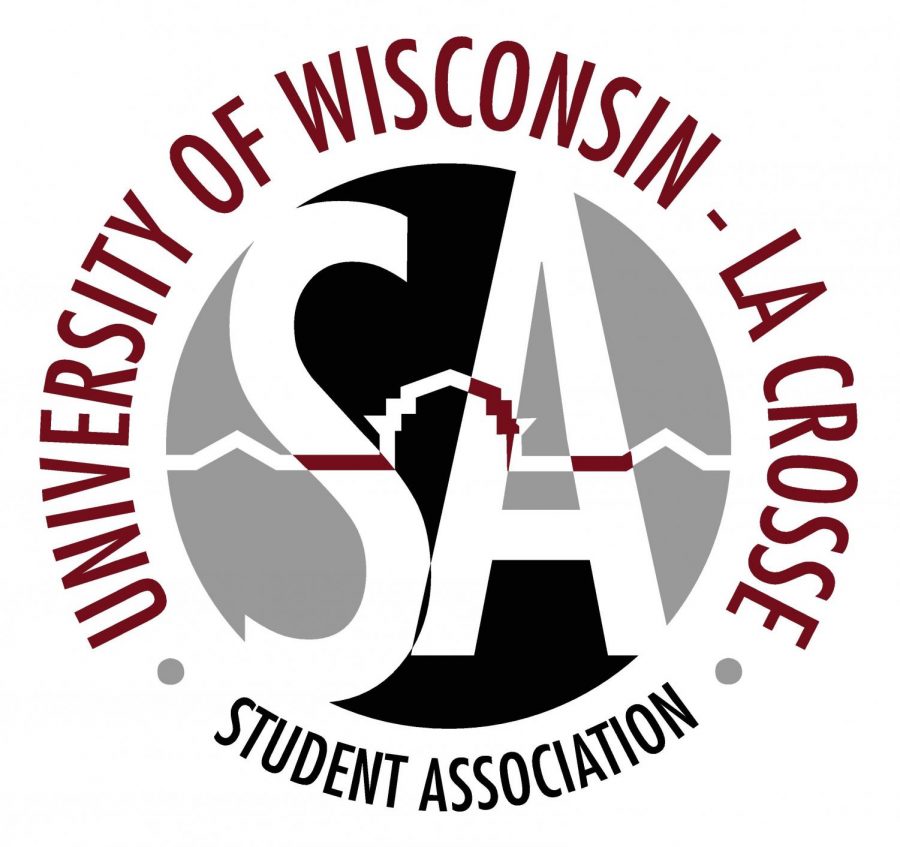Student Association meets to talk about the bike-share program and COVID-19 virus
March 12, 2020
Student Association (SA) met on March 11 to welcome guest speakers with information about a bike-share program set to be implemented within the La Crosse community, the recent COVID-19 virus mandates placed by the University of Wisconsin-La Crosse administration and inclusivity training for senators.
Peer health advocate Emily Holden spoke with SA in regards to a new bike-share program set for the La Crosse community to adopt. Having changed partners from startup Zagster to Kolonie, Holden labels this change in partnership as one set to benefit the La Crosse area, with headquarters in the Twin Cities area.
Holden made it clear that this program is to be implemented within the city and not specifically UWL, with a release date set for April.
The Recreational Eagle Center (REC) currently offers bikes, a service that Holden says often sees a long waiting list that withholds students from yearlong bike access.
“We are looking to find funding to have two Kolonie stations on UWL campus, in order to for this program to impact the greater community,” said Holden.
Interim Student Health Center supervisor and medical supervisor Abby Deyo spoke with SA to discuss the email sent out to UWL students from Chancellor Joe Gow, explaining further the week of canceled classes, March 22-28 and the addition of online classes. March 29-April 11.
“This was not a snap decision; this is something the Chancellor and the cabinet have been talking about for a number of weeks,” said Deyo.
With the acceleration of the COVID-19 virus, referring to the World Health Organization’s (WHO) decision to label this illness as a worldwide pandemic, more cases are being made aware of in Wisconsin.
Two cases have been discovered in Dane County and one in Pierce County and as of an hour before the start of the SA meeting, three other cases total between Waukesha and Fondulac.
“What we do know is that we can expect it to come to La Crosse, and we want to be as prepared and protective of UWL and the greater La Crosse community whenever it does,” said Deyo.
“There are many things that are yet to be figured out with this tentative four-week plan, but we can assure you that our academic departments and administration are working very hard to help students understand this better,” said Deyo.
Deyo offered whatever knowledge she could offer to SA, as this process is still day to day and she may not be able to answer all questions as of yet. State affairs director Alex Becker asked what is being done by the Student Health center in receiving test kits from Gundersen or Mayo health clinics.
Deyo said that the Student Health Center is in possession of their own test kits, but will need to send them to Madison or Milwaukee, where respected hygiene and health testing centers are located.
“As of last Monday, the most recent time I talked with Gundersen, a test is being offered locally, as well as Mayo clinic offering testing kits in Rochester,” said Deyo.
The distances of these health centers and hospital testing facilities are a concern for UWL, as they would like to have immediate results for students suspected who may have been infected with COVID-19, and would also wish to sperate themselves from any possible issues with students who may not have the privilege of health insurance to cover these tests.
Being an outpatient only facility, the Student Health Center is in possession of materials like respirators, oxygen and I.V fluids.“So we do have things we can use here on campus,” said Deyo.
Sen. Alaina Goodreau asked what fieldwork for education students would look like, Deyo said that it will be up to the program’s school district in which UWL students participate in for determining what’s to happen.
Sen. Cait McReavy asked Deyo if anything is being done regarding misinformation or xenophobia through the Student Health Center.
Deyo explained that the centers have asked UWL communications to have information go through the respected health committees, but it remains a concern for Deyo that students may not access information through the website in order to seek out this proper information.
Deyo suggested that students rethink their travel plans and weigh their options based around the location for their spring break. “Some areas are more at risk than others, as there are many unknowns at the moment. Any travel puts you at risk, as we believe we may have a few undiagnosed cases running around,” said Deyo.
Becker asked Deyo for some more clarification regarding what students should do if they are required to self-quarantine. “Stay in your room as much as possible. We know that students may live in a shared living space where there may be a common bathroom, we ask those students to wear masks whenever they go to the bathroom or any other communal areas,” said Deyo.
For students in residence halls, Deyo said, “Students within shared spaces are a concern, and we are looking where they may need to go if they are in need of quarantine or be isolated while still living on campus.”
President Sita Agterberg wishes to understand why exactly classes are being canceled and what would happen if placing someone forcibly into quarantine would influence a student denying isolation, as it is illegal to do so.
Deyo explained that the stages we are at currently with COVID-19 require only a self-induced, voluntary quarantine. She did mention, however, that there are places in the United States, such as New York, that are calling in the National Guard to enforce entire towns and neighborhoods into quarantine.
“I don’t anticipate that something like that would happen here, right now it’s kind of an ‘on your honor’ type of situation, and we are confident to say that UWL students care about their peers in order to do the right thing,” said Deyo.
If students wish to self-quarantine, UWL health services are ready to offer themselves in order to meet the comfort standards needed in order to do so appropriately.
Deyo said that at some point COVID-19 will be in La Crosse. “No matter what we do it will come here, and I’d like to say if we continue being really strict it won’t, but at the same time people in this country enjoy the freedom to travel, which is something we can’t control,” said Deyo.
The idea of canceling classes for Deyo means the prevention of “mass gatherings” of students, as the health departments here at UWL wish to take on this pandemic within the greater La Crosse area to take place initially off of UWL’s campus.
“We might not be able to stop it, but we might be able to slow things down,” said Deyo said. “Generally, the younger you are, the better you are going to be able to handle the coronavirus. What we should be concerned about is being vectors for others with weakened or compromised immune systems.”
Becker asked if she could clarify what’s to happen with students who are currently studying abroad and whether the students who are studying in areas like Italy and South Korea are the only ones who are to be called back to the United States by UWL.
“Currently, under policy states that all CDC level 3 countries will be called, especially our students in Italy, and those who never made it to South Korea,” said Deyo. The policy also mentions that countries with lower travel warnings are to be considered on an individual basis.
As of right now, no students from UWL are in danger of COVID-19 during their abroad studies, and Deyo, along with UWL health services, will be actively monitoring the health levels of these countries. “This is a daily discussion,” said Deyo.
Vice President Dana Nielsen asked what student workers should do with respect to their limited time on campus. “Some of our departments are very reliant on student workers, so the initial call was that if people wished to come into work then they can,” said Deyo.
Chancellor Gow stated in a press conference that they wish to keep as many services opened for students as possible, without putting people at risk.
“Inevitably, people will be traveling over spring break,” said Deyo. “That’s really concerning for me as a medical professional since it’s still a very large unknown.”
SA held diversity training, where senators were placed into small groups and asked to answer questions about their privilege and what identities they wish to understand about themselves better, as well as which ones they identify with. Inclusivity Director Faith Fischer led the training and the remainder of the training will resume whenever SA meets again face-to-face.






